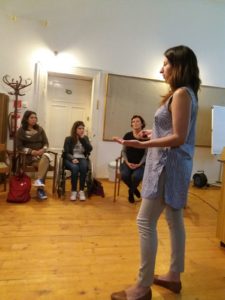In June, Senior Organizer Rachel Ramirez’ research — titled “The community organizing model of organizational leadership” — was awarded “Best Abstract” by a panel of judges at the the Chicago Universities for Public Policy Research Symposium at Northwestern University.
Rachel originally submitted this research for her master’s degree in Public Policy and Administration at Northwestern, which she completed in 2016 while working full-time at CCH.
By Rachel Ramirez

I began my organizing career about seven years ago under the guidance of an organizer who amazed me by seeing the possibility for transformative social change in every issue, no matter how terrible or unjust. What I didn’t realize was that as his mentee, I myself was a participant in and beneficiary of the “community organizing model of leadership” from day one. As a novice Midwest Academy intern, I would come back to the office from the field with information on the issues and social problems that community members identified during our one-on-one conversations. My early mentor would ask me questions, push back, motivate me, and send me back out into the field to keep doing the work myself. Like most new organizers, I felt lost, frustrated, and energized as I witnessed and helped to unfold a successful campaign to prevent the total loss of public medical care in an impoverished Chicago community.
The capacity of organizing to “turn pain into power” (a refrain often used by CCH leader Leeanna Majors) and to create real change against the tide of the status quo continues to captivate me, and to be underestimated by almost everyone outside of the organizing field. Organizers know how to grow the leadership of people who are often overlooked, foster creative teams, and help and guide people into strategic battle in the public arena. Organizers are rarely seen as “leaders” in the traditional sense, because, just as my mentor was doing in my first summer of organizing, we lead from behind. It was the realization during my graduate school program in Public Policy and Administration that organizing is underappreciated and misunderstood in both the public and private sectors that agitated me to research and write about the organizing model of leadership, and I am pleased that I have been able to share it in writing and in presentations with organizers and non-organizers alike.
My master’s thesis poses the first known model of organizational leadership based on organizing practices. This research uses a grounded theory approach, including the development of a visual model, to synthesize the perspectives of seven experienced Chicago-based community organizers and the existing literature to create a community organizing model of organizational leadership. Findings show that while the community organizing model shares commonalities with both the servant leadership and transformative leadership models, community organizing practices constitute a unique model of leadership because of their emphasis on public power. Building a more powerful organization is the baseline for all community organizing leadership objectives, practices and skills of community organizers. A powerful organization allows the development of community leaders to lead to efficacy in the public arena via strategic campaigns.
It is not my organizer’s ego that compels me to want to make the organizing model of leadership more widely known. Most organizers, myself included, do not desire to be “seen” by the traditional power structures that we are helping to bend to the will of the people. However, organizing is direly needed in conflict situations across the United States and the globe, to help people work together to transform their society and achieve what they need through effective, nonviolent means. And the benefits to organizing of becoming a more widely respected field include a broader stream of funding and of talented aspiring organizers. I hope to continue to contribute as both a practitioner and a researcher in order to help our field grow to meet the challenges of our time, and to help lead more individuals onto this path of social change as my first mentor did for me.
